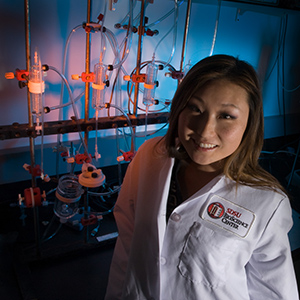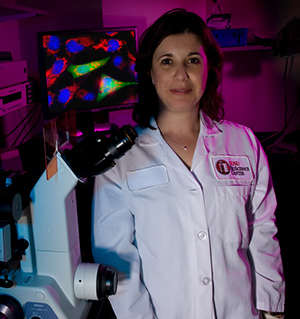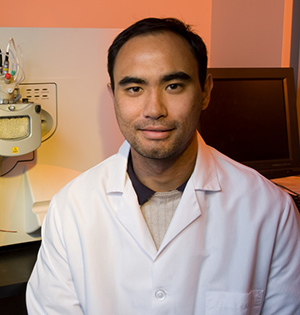


Research
TThe Donald P. Shiley BioScience Center is the first and only multidisciplinary center in the country to focus its research efforts on the critical nexus of infection, inflammation and cardiovascular disease.
This multidisciplinary approach, combining cardiovascular, immunological, and microbial expertise is taking place in an environment that fosters innovative research.
Research Topics
- Microbial metagenomics of periodontal disease and its relationship to systemic inflammation.
- Scott Kelley, Balambal Bharti, Rosalin Le, Karen Schwartzberg, Suzanne Lindsay, Dan Calac, RG
- Impact of childhood exposure to coxsackievirus on postnatal cardiac stem cells and risk of heart failure.
- Ralph Feuer, Roberta Gottlieb, Jon Sin, Ginger Tsueng, Jenna Tabor-Godwin
- Role of autophagy in infection (bacteria, coxsackievirus, Trypanosoma cruzi).
- Kelly Doran, Celia Ebrahimi, RG
- Ralph Feuer, Jon Sin, Jenna Tabor-Godwin, RG
- Patricia Romano, RG
- Role of autophagy in inflammation, aging, and metabolic syndrome
- Phyllis Linton, Michael Gurney, RG
- Kim Finley, Michael Gurney, Phyllis Linton
- Allen Andres, Robert Mentzer, Bruce Ito, Phyllis Linton, RG
- Influenza and innate immunity
- Joy Phillips, Marilyn Thoman
- Peptide modulators of innate immunity and prevention of infection
- Kelly Doran, Marilyn Thoman
- Joy Phillips, Roland Wolkowicz
Research Updates (September 2012)
Patricia Romano, a visiting scientist from Argentina, recently published a paper based on work initiated in the Gottlieb lab, showing that autophagy is required for cellular invasion by the parasite Trypanosoma cruzi. This organism causes Chagas Disease, which leads to heart failure and affects more than 16 million people in Latin America. It is becoming more prevalent in the U.S. due to immigration and advance of the insect vector due to global warming.
Molecular and cellular mechanisms involved in the Trypanosoma cruzi/host cell interplay.
Romano PS, Cueto JA, Casassa AF, Vanrell MC, Gottlieb RA, Colombo MI.
IUBMB Life. 2012 May;64(5):387-96. doi: 10.1002/iub.
Jenna Tabor-Godwin and members of the Feuer and Gottlieb labs have published a paper revealing the important role of autophagy for coxsackievirus infection of stem cells. This work is leading to a new understanding of the impact of viral infection of stem cells during early childhood.
The role of autophagy during coxsackievirus infection of neural progenitor and stem cells.
Tabor-Godwin JM, Tsueng G, Sayen MR, Gottlieb RA, Feuer R.
Autophagy. 2012 Jun 1;8(6):938-53.
Related work to test the possibility that early childhood infection with Coxsackievirus might lead to heart failure is being conducted by graduate student Jon Sin, who is co-mentored by Dr. Ralph Feuer and Dr. Gottlieb. Using the animal model developed by Gottlieb and Gustafsson, he presented his findings at the 2012 American Heart Association Basic Cardiovascular Research Council meeting.
The Impact of Coxsackievirus Infection on Cardiac Stem Cells and Postnatal Heart Development.
Jon Sin; Jenna Tabor-Godwin; Ralph Feuer; Roberta Gottlieb
Circulation.2011; 124: A16850
Juvenile exposure to anthracyclines impairs cardiac progenitor cell function and vascularization resulting in greater susceptibility to stress-induced myocardial injury in adult mice.
Huang C, Zhang X, Ramil JM, Rikka S, Kim L, Lee Y, Gude NA, Thistlethwaite PA, Sussman MA, Gottlieb RA, Gustafsson AB.
Circulation. 2010 Feb 9;121(5):675-83.
Tamsin Sheen, a student in Dr. Doran’s lab, used an immunomodulatory peptide developed by immunologists Ed Morgan and Marilyn Thoman, and Nebraska chemist Sam Sanderson, to control wound infection by methicillin-resistant Staphylococcus aureus. This dangerous bacterial strain is responsible for severe infections and death, and is resistant to many antibiotics. The peptide, known as EP67, activates the innate immune response to clear the infection.
Control of methicillin resistant Staphylococcus aureus infection utilizing a novel immunostimulatory peptide.
Sheen TR, Cavaco CK, Ebrahimi CM, Thoman ML, Sanderson SD, Morgan EL, Doran KS.
Vaccine. 2011 Dec 9;30(1):9-13.
Dr. Joy Phillips and collaborators used EP67 to activate innate immunity to protect against influenza infection. This important finding offers a potential treatment for influenza that doesn’t depend upon a specific vaccine and could be used after exposure. The study received attention in the media around the world.
Innate immune induction and influenza protection elicited by a response-selective agonist of human C5a.
Sanderson SD, Thoman ML, Kis K, Virts EL, Herrera EB, Widmann S, Sepulveda H, Phillips JA.
PLoS One. 2012;7(7):e40303.
Recent SDSU doctoral graduate Brian Bartlett and mentor Dr. Kim Finley are investigating autophagy in aging and reported that autophagy is important to the defense against age-related neurodegeneration.
p62, Ref(2)P and ubiquitinated proteins are conserved markers of neuronal aging, aggregate formation and progressive autophagic defects.
Bartlett BJ, Isakson P, Lewerenz J, Sanchez H, Kotzebue RW, Cumming RC, Harris GL, Nezis IP, Schubert DR, Simonsen A, Finley KD.
Autophagy. 2011 Jun;7(6):572-83.
Shiley BioScience Center Research Team
Cardiovascular Group
Immunology Group
Metabolic Disease Group
Doctoral Graduate Students
- Yan Wei Lim
Master's Degree Students
- Bill Bray
- Tuan Tran
- Ayeh Barekat
Undergraduate Students
- Nick Harrison
- Brandon Molina
- Catherine Conner
- Samvel Avagyan
- Ema Suarez
Staff
- Brandon Morgan
- Edgar Herrera
- Ruth Mauntz
- Madhulika Achal
- Roxanne Kotzebue
Collaborating Scientists
- Scott Kelley, Ph.D.
SDSU Biology - Ralph Feuer, Ph.D.
SDSU Biology - Kelly Doran, Ph.D.
SDSU Biology - Chris Glembotski, Ph.D.
SDSU Biology - KeElizabeth Dinsdale, Ph.D.
SDSU Biology - Eric Ratliff, Ph.D.
SDSU Chemistry